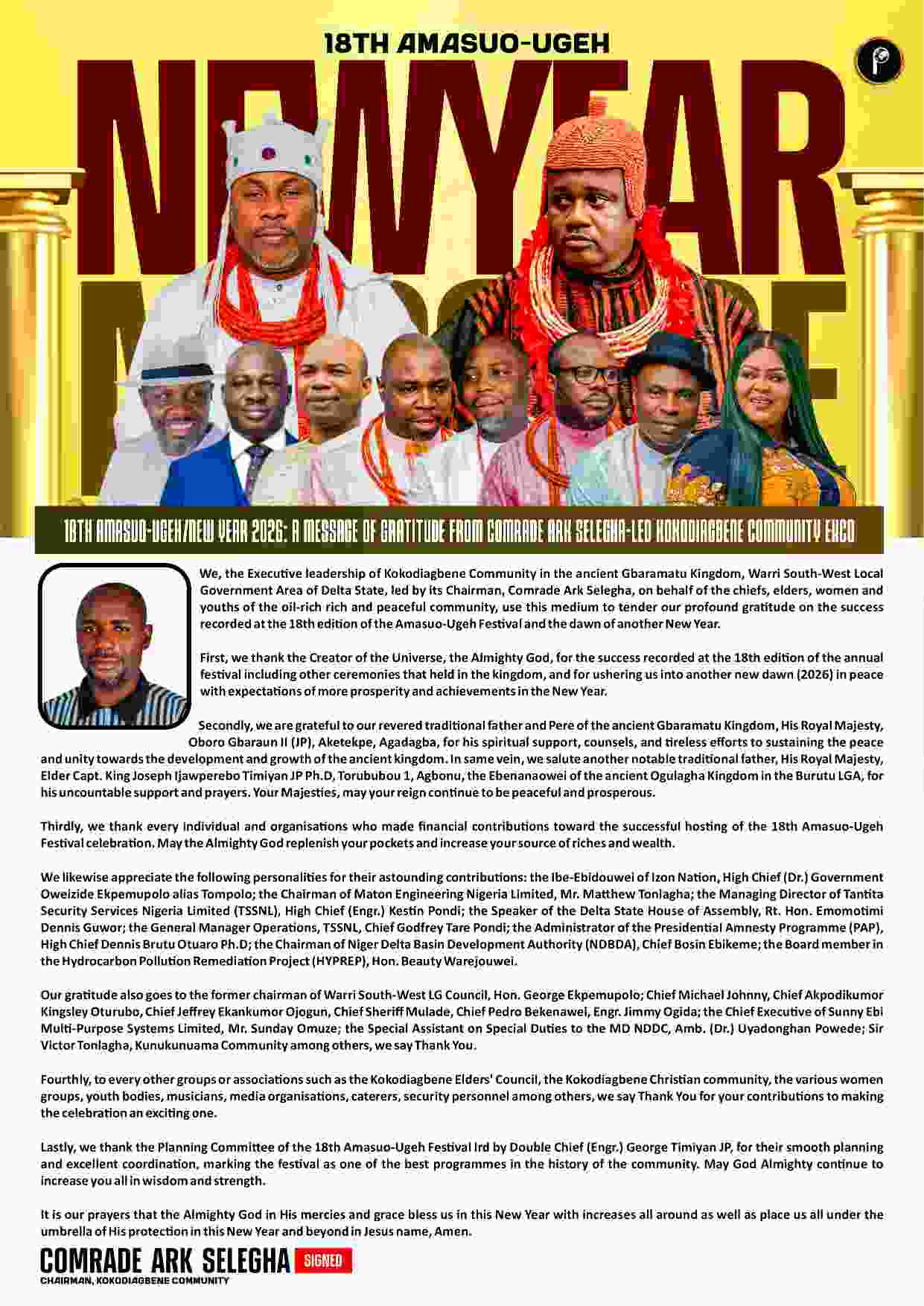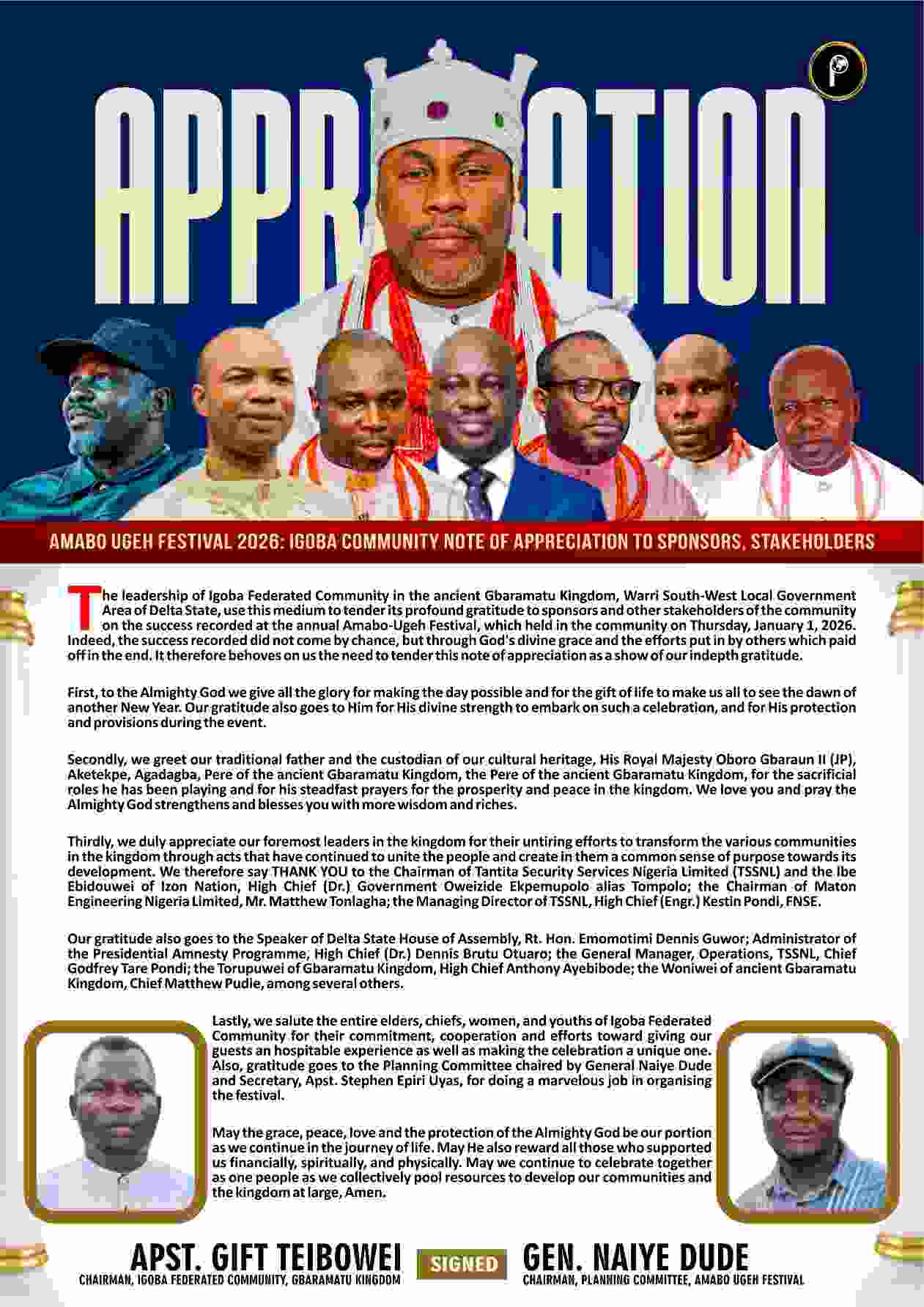[EXCLUSIVE] The Gbaramatu 'Ayoro' and the 90-Day Cultural Seclusion Rites By Abai Francis
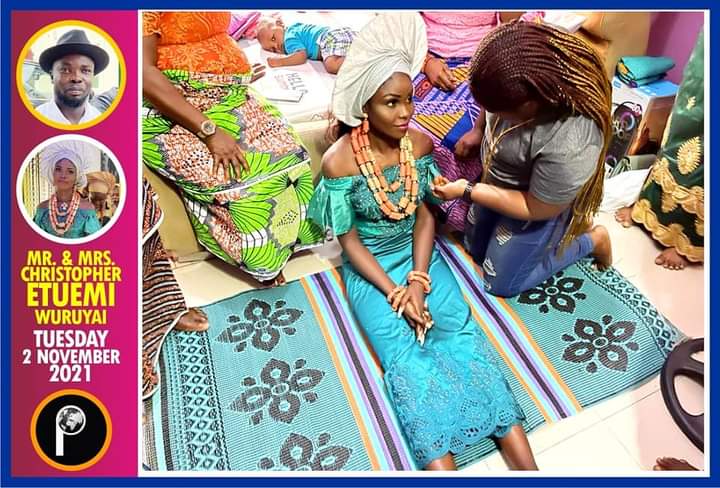
Did you know that, according to a native custom of the Gbaramatu Ijaws of Delta state pertaining to marriage, a newly married wife (known by the native name 'Ayoro') is expected to observe a 90-day period of seclusion?
The date was Tuesday, the 2nd day of November 2021, and the setting was the Warri residence of Comrade Christopher Etuemi Wuruyai, a former youth president in Gbaramatu Kingdom (and Senior Special Assistant on Security during the tenure of Delta State Governor Ifeanyi Okowa).
The atmosphere was one of excitement as Comrade Etuemi, who got married of recent, was in company of his relatives and friends that were about to witness with him the final ceremonial rites of his 'Ayoro' in accordance with the Gbaramatu Ijaw culture, known as 'Odogboro' and 'ila-pele:, as was then practiced but which in modern day is gradually fading away.

'Ayoro' is an Ijaw word that is popularly used by the Gbaramatu Kingdom Ijaws in the Warri South-West Local Government Area of Delta state in reference to a new wife. The name bestows dignity, honour and beauty. Though these days, the constant use of the name 'Ayoro' has become an household identity used in addressing married women, however, it is a title for a new wife.
The Ayoro has a special place of honour according to the Gbaramatu Ijaw cultural practice. She is treated as a queen and on her coming into the home of her husband, needs to be welcomed in a royal way. And, as then practiced from time immemorial, while welcoming her to the abode of her husband immediately after payment of her bride price (dowry), she is expected to observe seclusion for the required days.
During the time of her seclusion, she is not allowed to engage in any household chores such as cooking for her husband, cleaning the home, and other associated tasks.
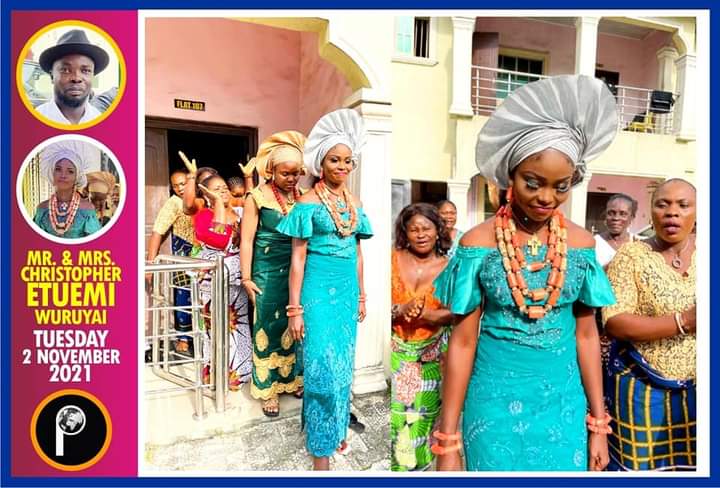
As culture demands, during this time, she is well dressed in traditional attires with three native beads (Ibolo) placed around her neck and one bead each along with a heavy silver bango (Idawani) on both of her ankles. While she is expected to change her attires each day, however, the 'Ayoro' is not allowed to take off the beads, save only for the silver bangos when she wants to sleep at night, for safety reasons.
To keep her company, she is entitled to a female companion known in the Gbaramatu Ijaw dialect as 'Ayoro-tugbala-ara' who stays with her throughout the period of seclusion. Her companion including other family members help the 'Ayoro' to prepare meals, wash the dishes, and do other house chores. The 'Ayoro' is thus pampered and given all the attention she deserves and made to feel very special with all of her needs provided for.
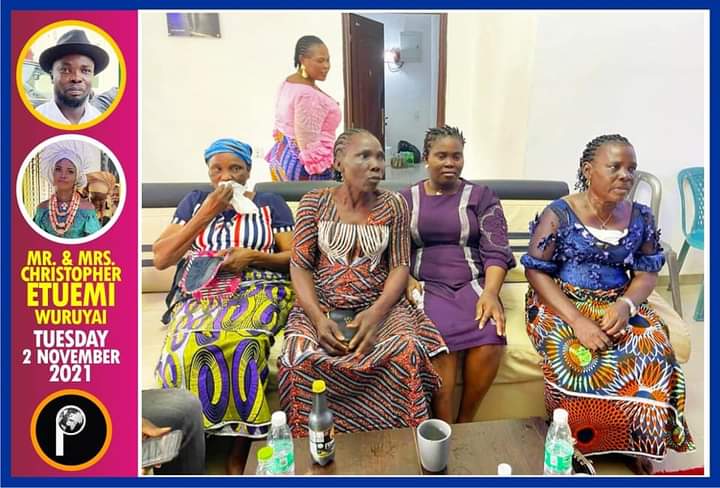
Highlight of activities at the completion of the required days of seclusion include taking off the beads from the 'Ayoro' by a young girl brought in for that purpose, thus ending the period of her seclusion. As usual, this event is celebrated by the husband, who invites families and friends to rejoice with him in a social ceremony.
“The ceremony is known as Ila-pele,” said Comrade Etuemi, the organiser of the ceremony in a chat with PENGlobal Social, as he throws more light on the cultural practice.
"As was then practiced, before the ila-pele, comes the Odogboro; it is like a normal social party for the husband's family and has nothing to do with his in-laws. A night to the ila-pele you will now observe Odogboro till the next day. The men will sit outside while the women will be with the wife that has been an Ayoro for three months.
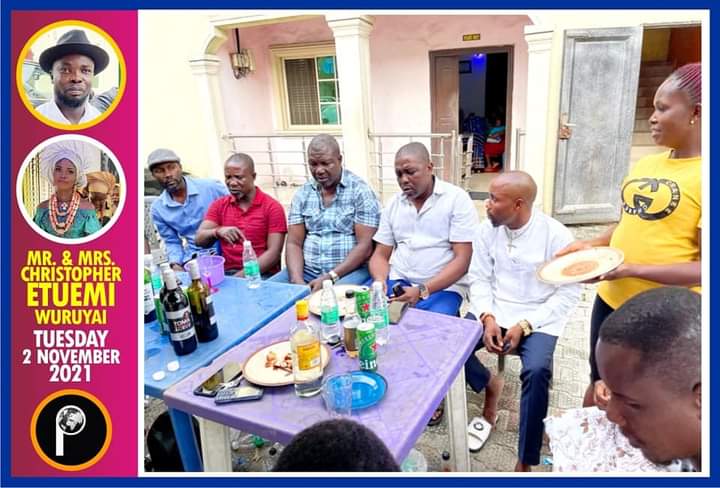
"The next morning they will now observe the ila-pele, that is, taking-off of her beads by a young girl, after which the woman can now be free to engage like every other woman in the family, in daily chores.
"During the period of her seclusion she is taught about the family she is married into to afford her the opportunity to get to know the immediate and extended family members," he added.
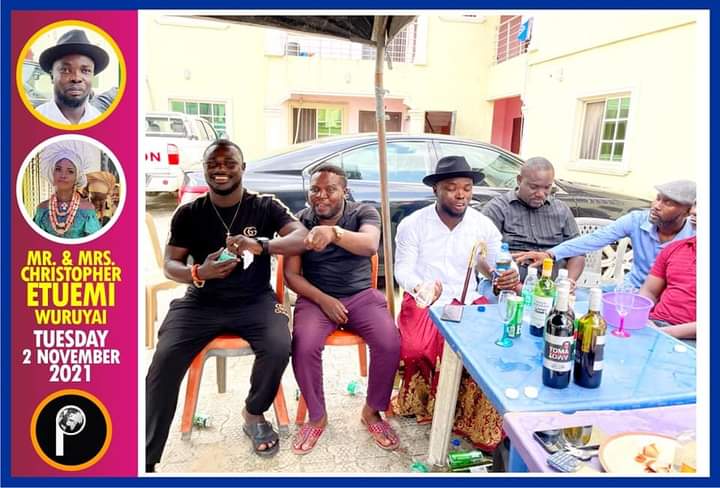
However, in the case of Comrade Etuemi, in his attempt to revive the cultural practice of old, he had to flex things a little for the sake of convenience.
"When I got married to my wife, I said after we must have spent a night in the hotel, let’s come home because we have a sweet culture I want to revive. So I called some of my aunties and families, and for practice convenience, instead of three months, it was three days. Because we are in modern times we can’t keep someone for a whole long three months as that will kill the excitement; so we reduced it to three days but we still have to practice it.

"For the three days, it was so interesting; my wife enjoyed it. During these three days she didn’t do anything. I literally did everything. Then they brought one of my nieces to stay with her for the three days. We did not do the Odogboro the night to the Ila-pele; instead, we did the Odogboro and the Ila-pele together just for convenience.
"And so, while the men were doing the Odogboro outside under the canopy, the women were inside doing the ila-pele. We got a mat as she was supposed to sit on the floor and not in a chair, as was the practice. They dressed her. She had to come out three times (to indicate the three months period) to greet the men outside. And each time she does that, the husband appreciates her monetarily. It was very interesting," he confessed.
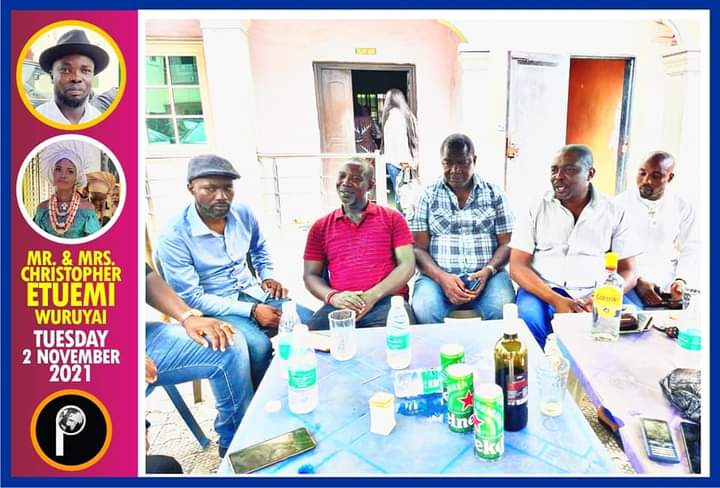
According to Comrade Etuemi, many who witnessed the ceremony and others who heard of it were thrilled and saw the significance of the practice which had long been abandoned due to the influx of foreign practices to the detriment of native tradition and custom.
"A lot of persons copied from it," Comrade Etuemi said, beaming with smiles. "Not just the women, a lot of my uncles came and they saw and appreciated the sweet culture we had abandoned for so long. Even my elder sister called to say that what I did, others were talking about it and everybody wants to do it as it was very interesting. Again my wives families were excited as they came to know of it.
"You know, it was like a formal welcoming ceremony after you must have got married. In this modern days of marriage, the couple go to the hotel and from there they go home. By so doing the 'Ayoro' don’t get to know the immediate and extended family members too well. Most of her own family do not know where their daughter is going. They don’t have the opportunity to get to the house. This is like an opportunity to bring family members together," he stressed.
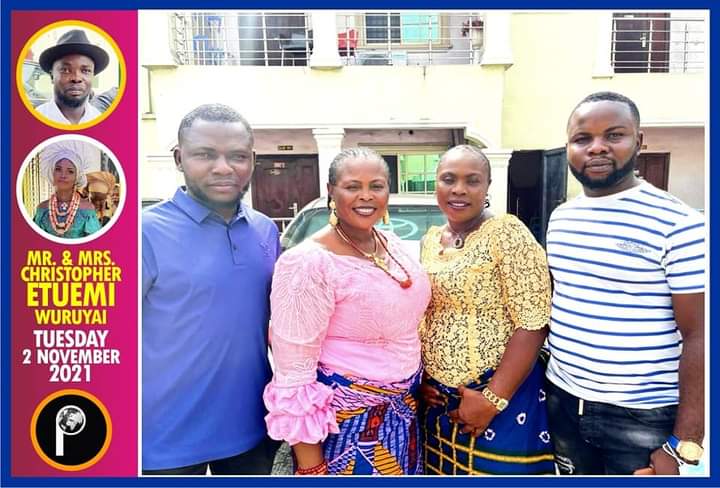
It is no longer news that most African traditions and cultures are being lost, most especially as modern views seem to bastardise the way of life as formerly lived by the people. In fact, most African traditions and cultures are seen as uncivilised in a modern world. But for people like Comrade Etuemi, culture should be jealously guarded and practiced with pride as that is what makes a people unique.
"For me, I am a cultural advocate" said Comrade Etuemi, who likes to be addressed as a Senior Cultural Advocate of Niger Delta.
"I just want to set a record that we have a very sweet culture, especially the Gbaramatu Ijaw people. Nowadays, we don’t practice our culture any more. We are just taking from everywhere especially the one we see in the movies. It seems like we don’t have a culture. But looking at it, we have a unique practice that if we practice, others will even emulate.
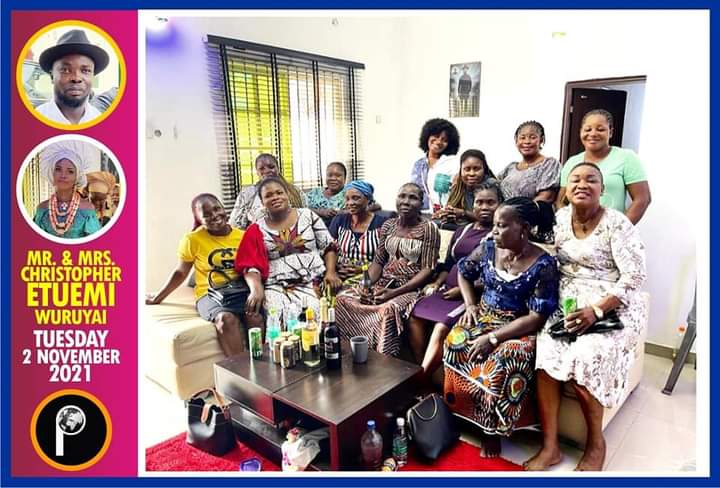
"This is peculiar to Gbaramatu and not other Ijaws. We seem to abandon our culture and adopt other people’s practice. For sustenance sake I am just trying to show example so that others can emulate to revive our dying culture. I am a very vocal voice when it comes to cultural sustenance in the Niger Delta especially the Ijaw people. Wherever Ijaw culture is, I am there. And I am not backing out any soon. I don't know it all and so others who are more knowledgeable in our culture can also voice out especially to make corrections if the present generation is deviating.
"I have travelled around the world and I have seen how people struggle to sustain their culture even in strange lands. Real civilized people identify with their culture. So, this is my culture, this is who I am. This is who God has created me to be because He saw every race before He created me as an Ijaw man from Gbaramatu Kingdom. And the Bible says, 'Remove not the old landmark which thy fathers have laid.' So, I am just quietly using myself as an example to practice these things so that people will see," he added.
NOTE: First published November 6, 2021 on PENGlobal Facebook page
#pengloballifestyle #culture #tradition #Gbaramatu
